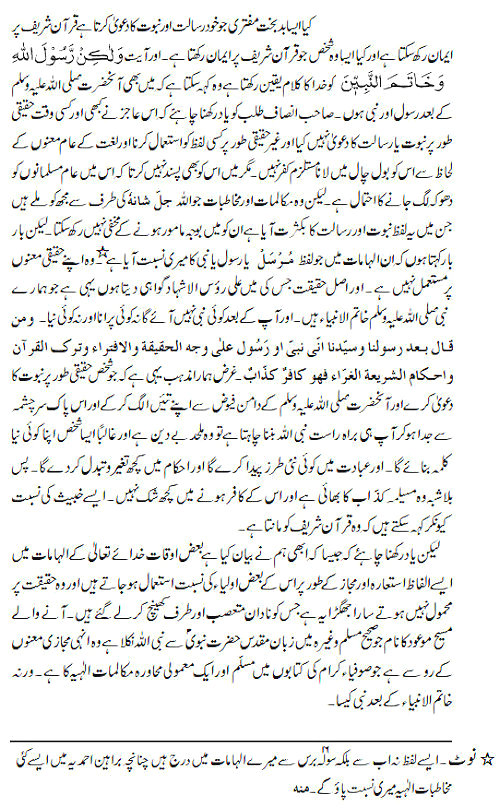“Can a wretched imposter who claims messengership and prophethood
for himself have any belief in the Holy Quran? And can a man who
believes in the Holy Quran, and believes the verse ‘He is
the Messenger of Allah and the Khatam an-nabiyyin’
to be the word of God, say that he too is a messenger and prophet
after the Holy Prophet Muhammad?
Insaf-i Talb [pen-name of the enquirer] should remember
that I have never, at any time, made a claim of nubuwwat
or risalat [prophethood or messengership] in the real sense.
To use a word in a non-real sense, and to employ it in speech
according to its broad, root meaning, does not imply heresy (kufr).
However, I do not like even this much, for there is the possibility
that ordinary Muslims may misunderstand it.
However, by virtue of being appointed by God, I cannot conceal
those revelations I have received from Him in which the words
nubuwwat and risalat occur quite frequently. But
I say repeatedly that, in these revelations, the word mursal
or rasul or nabi which has occurred about me is
not used in its real sense. (Footnote: Such words have not occurred
only now, but have been present in my published revelations for
sixteen years. So you will find many such revelations about me
in the book Barahin Ahmadiyya.) The actual fact, to
which I testify with the highest testimony, is that our Holy Prophet,
may peace and the blessings of God be upon him, is the Khatam
al-anbiya and after him no prophet is to come, neither an
old one nor a new one. …
But it must be remembered that, as we have explained here, sometimes
the revelation from God contains such words about some of His
saints in a metaphorical and figurative sense; they are not meant
by way of reality. This is the whole controversy which the
foolish, prejudiced people have dragged in a different direction.
The name ‘prophet of God’ for the Promised Messiah,
which is to be found in Sahih Muslim etc. from the blessed
tongue of the Holy Prophet, is meant in the same metaphorical
sense as that in which it occurs in Sufi literature as an accepted
and common term for the recipient of Divine communication. Otherwise,
how can there be a prophet after the Khatam al-anbiya?”
(Anjam Atham, footnote, pages 27–28)
